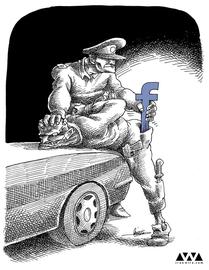
An Iranian Revolutionary Court sentenced eight people from across the Iran earlier this week to prison terms in connection with their use of Facebook.
The prison terms amounted to a total of 127 years between the eight activists, and charges, according to the Islamic Republic News Agency (IRNA), included “conspiracy against national security, propaganda activities against the system, offending the sacred and offending the commanders of the [Revolutionary] Guards.”
The sentenced activists hailed from across the country, the cities of Tehran, Yazd, Shiraz, Abadan and Kerman, and further details about their arrests and sentencing emerged in a letter that one of them, Fardieh Shahgholi, an Iranian-German, wrote to President Hassan Rouhnai.
“I have been in temporary detention for the past six months, 50 days of which I spent in solitary confinement,” Shahgoli wrote.
Shahgoli was detained and taken to Evin Prison two months ago, and said that the presiding judge showed a fundamental misunderstanding of how social media worked, using comments posted by other people on her Facebook page as “evidence” of her criminal activity.
“Now I have been condemned to three years in prison for my Facebook activities and what the judge calls propaganda against the [Islamic] system and offending the Supreme Leader.”
Judge Mohammad Moghisei, known for dealing harshly with human and women rights activists, handed down the sentences. Three people received sentences of 21, 19 and 18 years in prison. Two were given 50 lashes and ordered to pay the equivalent of $500 fines. All eight have appealed the decisions, though no trial date has been set.
Revolutionary Guards Lead Crackdown
The Revolutionary Guards’ Sarollah Corps in Tehran monitors online activity among Iranians and actively pursues individuals who use social networks to voice criticism about the regime. In 2010 one of its directors announced that the division was focusing on online activity. “Up to now we have not done anything about social networks,” he said, “but we are laying the groundwork to do so.” Recent arrests show just how the Sarollah Corps is overseeing operations.
Sarollah Corps played a key role in the suppression of protesters after the disputed presidential election of 2009. It deals with security in Tehran and handles street protests. But according to IRNA, the corps is now taking action across the country—and cracking down on cyber activism is increasingly part of its extended remit. In recent months more than 20 other Iranains from towns across the country have been arrested and transferred to Evin Prison. Some of those detained are under 20 years of age and have been arrested for posting political, social and cultural comments on Facebook. According to press reports their families are coerced into silence by the Guards or the judiciary officials at Evin Prison.
Less than a month ago Yadollah Movahed, the attorney-general of the southeastern province of Kerman, declared that 11 bloggers and cyber activists had received prison sentences of one to 11 years. Seven of the bloggers—Ali-Asghar Honarmand, Nasim Nik-Mehr, Maliheh Nakhai, Mohammad-Hossein Mousazadeh, Abbas Vahedi, Ali-Reza Vaziri and Sara Sajjadpour—wrote for a site called Narenji (‘Orange’). Their subjects were non-political and often focused on new communications technologies but they were arrested by the intelligence arm of the Revolutionary Guards in Kerman.
The news made headlines but none of the cabinet members who themselves are active on Facebook made any public comment, despite their earlier pronouncements about “citizens’ rights.”
Rouhani’s Broken Promises
Rouhani has repeatedly talked about removing internet filters and securing freer access to social media as part of his commitment to upholding citizens’ rights, a key part of his electoral platform. Such harsh sentences are a clear reminder of the enduring fault lines in Iranian politics today, as well as the enduring power of the Supreme Leader and his Revolutionary Guards.
Earlier this year, reformist website Kaleme reported that the intelligence arm of the Revolutionary Guards arrested six people—Naghmeh Shahsavandi, Massoud Ghasemkhani, Farid Akrami, Massoud Talebi, Mehdi Reyshahri, and Fariborz Kardardfar—in connection with Facebook activities. They were put on trial along with Roya Saberinejad Nobakht, an Iranian-British woman arrested in October 2013 after commenting on Facebook during a visit to Shiraz. All were charged with the “conspiracy against national security.”
Their case was sent to the Revolutionary Court and, according to unofficial reports, they were sentenced to a total of more than 120 years in prison. When asked about the sentencing at a press conference, Gholam-Hossein Mohseni-Ejei, Attorney-General of Iran and a former minister of Intelligence said, “In the Revolutionary Court we process many kinds of felonies, but there is no such thing as a ‘Facebook charge.’” He said sentencing was in line with already-existing legislation; if someone were to break a law using Facebook or another social media tool, they would be dealt with according to the laws specific to that particular crime.
But President Rouhani continues to make very different promises. On May 17 of this year in a speech at the Fourth National Festival for Communications and Information Technology he talked about removing filters and limitations on using social networks. “We officially recognize the right to communicate with international information networks as a citizens’ right,” he said.
Many of Rouhani’s government officials maintain Facebook pages, from Foreign Minister Mohammad Javad Zarif to Ali-Osat Hashemi, the governor of Sistan-Baluchistan province. Both his Minister of Culture Ali Jannati and Minister of Communications Mohammad Vaezi have made statements similar to Rouhani.
But other organizations which are not under the control of his government pay no attention to these words. Not only have they ignored Rouhani’s intentions around digital freedom and citizens’ basic rights, they are intensifying their repression by the day.
visit the accountability section
In this section of Iran Wire, you can contact the officials and launch your campaign for various problems

























comments